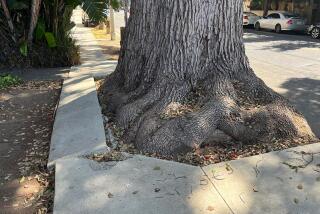$3-billion proposal to repair Los Angeles streets advances
Los Angeles lawmakers Wednesday agreed to pursue further analysis of an ambitious $3-billion proposal to fix thousands of miles of the city’s most deteriorated streets.
The money could come from a mix of sources, officials say, including a property tax or borrowing against future sales or gas tax revenues. One option would be to ask property owners to increase taxes the equivalent of 1% of their property’s value, paid over 29 years. On a home worth $600,000, that would mean paying about $200 more a year.
The new revenue would be used to resurface and rebuild the city’s broken streets, part of a 60-year backlog of repairs.
Car-jarring potholes on the nation’s largest network of streets are a political issue and a constant irritant to Angelenos.
“When you hit a pothole in the city of Los Angeles, you not only feel it — you hear it,” said Councilman Joe Buscaino, who co-sponsored the street repair plan.
City officials hope to place the proposal, which would require approval from two-thirds of voters, on the November 2014 ballot. The measure’s supporters say needed street repairs will become more expensive the longer they are delayed.
The proposal, due back before the City Council in October in a more detailed form, isn’t likely to address another persistent resident complaint: busted and buckled sidewalks. Fixing the estimated 42% of Los Angeles sidewalks that are in disrepair could cost the city an additional $1.5 billion.
The city does not have a comprehensive list of damaged sidewalks, and officials have said that creating one would cost $10 million and take three years. Los Angeles can’t borrow money to fix sidewalks until it can identify which ones are broken, a Buscaino spokesman said.
Failing to include sidewalk repairs “would appear to be a missed opportunity,” said Madeline Brozen, program director of the UCLA Complete Streets Initiative. She said targeting only the most damaged sidewalks could be a way to keep costs down.
Some of the city’s neighborhood councils have criticized the bond proposal, saying homeowners can’t afford more taxes. City staff are exploring other financing options, including an incremental sales tax, additional vehicle fees or a change to the gas tax.
Since 2005, the city has paid for normal upkeep and maintenance on streets of good quality, but has left a backlog of severely damaged roads largely untouched.
Laying down slurry seals — the dark coating of asphalt, oil and water that keeps roads with minimal damage in good condition — costs about $25,000 a mile. Digging up deeply cracked and pothole-riddled streets and rebuilding them can be 10 times as costly.
Between 2005 and 2013, the estimated cost to repair the worst roads doubled from $1.5 billion to $3 billion. Officials say that if they do not act now, the cost will double again in the next decade.
More to Read
Sign up for Essential California
The most important California stories and recommendations in your inbox every morning.
You may occasionally receive promotional content from the Los Angeles Times.











